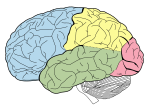Expressive aphasia (also known as Broca's aphasia) is a type of aphasia characterized by partial loss of the ability to produce language (spoken, manual...
59 KB (7,280 words) - 12:45, 17 April 2024
intelligence, however, is unaffected. Expressive language and receptive language can both be affected as well. Aphasia also affects visual language such as...
97 KB (11,793 words) - 09:17, 26 April 2024
area, and the deficit in language production as Broca's aphasia, also called expressive aphasia. Broca's area is now typically defined in terms of the...
44 KB (5,205 words) - 19:06, 30 April 2024
Aphasiology (category Aphasias)
of aphasias have been described, but two are best known: expressive aphasia (Broca's aphasia) and receptive aphasia (Wernicke's or sensory aphasia). Acute...
11 KB (1,445 words) - 16:43, 27 January 2024
of expressive language, and a symptom of all forms of aphasia, but patients whose primary deficit is word retrieval are diagnosed with anomic aphasia. Individuals...
30 KB (3,746 words) - 19:51, 25 April 2024
Language disorder (section Aphasia)
and a psychologist if accompanying behavioral problems are present. Expressive aphasia is characterized by partial loss of the ability to produce language...
19 KB (2,105 words) - 11:45, 21 April 2024
Global aphasia is a severe form of nonfluent aphasia, caused by damage to the left side of the brain, that affects receptive and expressive language skills...
23 KB (2,734 words) - 14:16, 17 March 2024
the basal ganglia, and can be seen in patients with expressive aphasia. Transcortical sensory aphasia is caused by lesions in the inferior left temporal...
18 KB (2,172 words) - 22:04, 4 March 2024
Communication disorder (section Aphasia)
progressive aphasias caused by progressive illnesses such as dementia. Acute aphasias Expressive aphasia also known as Broca's aphasia, expressive aphasia is a...
24 KB (2,756 words) - 17:11, 3 December 2023
Conduction aphasia, also called associative aphasia, is an uncommon form of difficulty in speaking (aphasia). It is caused by damage to the parietal lobe...
25 KB (2,894 words) - 10:45, 15 April 2024
Insular cortex (section Progressive expressive aphasia)
hallucinations were elicited by electrical functional mapping. Progressive expressive aphasia is the deterioration of normal language function that causes individuals...
63 KB (7,555 words) - 14:50, 6 May 2024
aphasia is a method for treating patients who have lost the ability to speak after a stroke or accident. Non-fluent aphasia, also called expressive aphasia...
22 KB (3,147 words) - 01:26, 30 April 2024
Wernicke's aphasia, also known as receptive aphasia, sensory aphasia, fluent aphasia, or posterior aphasia, is a type of aphasia in which individuals...
40 KB (4,785 words) - 03:18, 17 May 2024
between different aspects of production; for example, the difficulty of expressive aphasia patients in producing regular past-tense verbs, but not irregulars...
30 KB (3,457 words) - 02:47, 17 May 2024
causes. In 1997, he had a stroke, which left him with paralysis and expressive aphasia. He eventually grew to interpret this event as an act of grace, learning...
40 KB (4,116 words) - 20:07, 18 March 2024
Both expressive and receptive aphasia also affect the use of sign language, in analogous ways to how they affect speech, with expressive aphasia causing...
137 KB (16,057 words) - 00:04, 12 April 2024
despite the inefficiencies. Broca's aphasia is a specific type of expressive aphasia and is so named due to the aphasia that results from damage or lesions...
39 KB (4,316 words) - 16:31, 8 April 2024
results in expressive aphasia (non-fluent aphasia) while damage to Wernicke's area results in receptive aphasia (also called fluent aphasia). Explicit...
16 KB (1,779 words) - 16:55, 8 May 2024
arrest, which progressed into a "brain injury" leading to "significant expressive aphasia and significant memory issues" due to the prolonged lack of oxygen...
14 KB (1,385 words) - 11:46, 2 May 2024
Apraxia of speech (category Aphasias)
similar or alternative disorders. Although disorders such as expressive aphasia, conduction aphasia, and dysarthria involve similar symptoms as apraxia of speech...
25 KB (3,032 words) - 02:35, 17 May 2024
assessment for aphasia includes a gathering of a case history, a self-report from the patient, an oral-motor examination, assessment of expressive and receptive...
24 KB (3,069 words) - 02:42, 27 December 2023
needed] Agrammatism is seen in many brain disease syndromes, including expressive aphasia and traumatic brain injury.[citation needed] Agrammatism was first...
9 KB (1,219 words) - 23:48, 27 October 2023
she was 20 years old that caused temporary paralysis and temporary expressive aphasia. Several years later, she had a transient ischemic attack while on...
82 KB (4,989 words) - 23:07, 14 May 2024
Speech perception (section Aphasia)
example: Aphasia affects both the expression and reception of language. Both two most common types, expressive aphasia and receptive aphasia, affect speech...
64 KB (8,168 words) - 02:36, 17 May 2024
syndrome MCA syndrome PCA syndrome Aphasia Frontal lobe Expressive aphasia Abulia Parietal lobe Receptive aphasia Hemispatial neglect Gerstmann syndrome...
46 KB (5,217 words) - 06:01, 17 May 2024
understanding language. Receptive aphasia causes impaired comprehension. Expressive aphasia is reflected in odd choices of words, the use of partial phrases,...
20 KB (2,146 words) - 15:05, 20 December 2023
Landau–Kleffner syndrome (redirect from Progressive epileptic aphasia)
Landau–Kleffner syndrome (LKS)—also called infantile acquired aphasia, acquired epileptic aphasia or aphasia with convulsive disorder—is a rare childhood neurological...
18 KB (1,967 words) - 10:03, 21 April 2024
Progressive nonfluent aphasia (PNFA) is one of three clinical syndromes associated with frontotemporal lobar degeneration. PNFA has an insidious onset...
9 KB (919 words) - 08:22, 1 May 2024
behavior Social disinhibition Compulsive eating Language signs Aphasia Expressive aphasia The causes of frontal lobe disorders can be closed head injury...
18 KB (1,843 words) - 22:18, 29 April 2024
fissure produces the typical effects of a lesion in Broca's area (i.e., expressive aphasia). Some individuals afflicted with Broca's fissure are aided by speech...
2 KB (326 words) - 08:57, 17 January 2022














